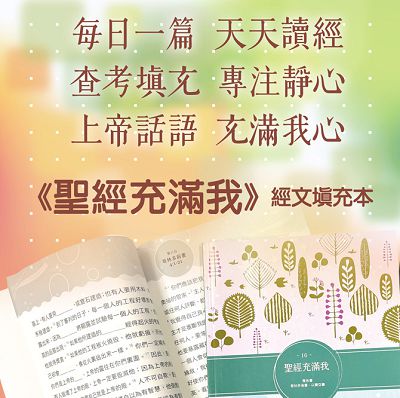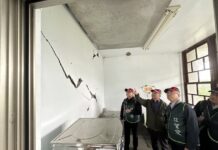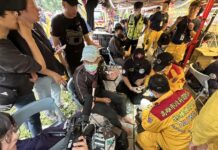March 19-25, 2012
Headline News
Rice bran oil poisoning in 1979 brought to the forefront amid government mishandling of food safety
Reported by Lin Yi-ying
Written by Lydia Ma
As the nationwide furor over imports of U.S. beef containing ractopamine, government cover-up of an avian flu outbreak, and new revelations over leanness enhancers in homegrown pork continue to rise across Taiwan, a look at recent Taiwanese history reveals that food safety scandals are not new in Taiwan. Youth Synergy Taiwan Foundation and a renowned blogger and member of Thai-peng-keng Maxwell Memorial Church invited Taiwan Oil Disease Victims Support Association General Secretary Chen Wen-pin to speak about an food poisoning incident that occurred in 1979 in central Taiwan.
According to Chen, in 1979, thousands of people were poisoned and developed pustules after consuming rice-bran oil that had been contaminated with polychlorinated biphenyls (PCB) and some of these victims included students and teachers from a school for blind children. However, the outbreak was originally discovered months earlier, toward the end of 1978, when Changhua Christian Hospital Department of Dermatology Chair Kao Hsin-yi learned during a tour of Fusing and Lukang townships that many low-income villagers had a strange skin disease. Kao suspected that this disease was the result of food poisoning.
Though Kao reported his suspicions to the local health department, his findings were ignored by authorities until the disease became an epidemic in central Taiwan. Upon investigation, the source of the poison was traced to a rice-bran oil company in Changhua, where polychlorinated biphenyls (PCB) normally used for heating had somehow leaked from ruptured pipelines into the rice bran oil.
“The rice-bran oil incident is probably the first major food safety crisis in Taiwan!” said Chen Wen-pin, who grew up in Lukang and had seen pustules on many of his classmates when he went to elementary school there. He later discovered the source of this skin disease after viewing a film and book produced by author Chen Chao-ju chronicling this incident.
“The number of victims who suffered food poisoning by consuming contaminated rice-bran oil ranges from 1,400 to 2,000 people,” said Chen Chao-ju. “But we know that many people don’t want to talk about it or confess that they were also victims because PCBs cannot be excreted and may even be passed on to future generations. Because victims fear being labeled and ostracized by society, they don’t want to draw publicity by claiming that they were also affected by this incident.”
Chen Chao-ju underscored that most of the victims of the rice-bran oil incident were poor people living in the countryside who didn’t know they had certain ights as citizens and consumers. She went on to add that the reason this incident became an outbreak was because government agencies failed to monitor food safety and ignored and undermined warning alerts sent by experts. Unfortunately, government response to recent scandals involving avian flu, US beef, and leanness enhancers in pork have shown that not much has changed in the past 3 decades.
“These recent scandals have a lot in common with the plasticizer scandal in 2011. Don’t assume that you won’t be the next one affected by food poisoning!” warned Chen Wen-pin. She also urged people to get involved because food safety affects everyone. “If you think that people decrying social injustices today are mere strangers and their concerns are none of your business, no one will mind you in the future when your turn comes to point out a social injustice!”






